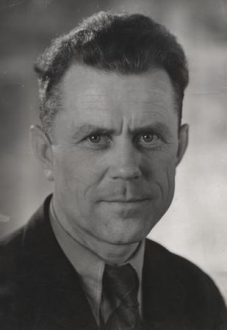Aksel Larsen
| Aksel Larsen | |
|---|---|
 |
|
| Leader of the Socialist People's Party | |
|
In office 1959–1968 |
|
| Preceded by | New office |
| Succeeded by | Sigurd Ømann |
| Leader of the Communist Party of Denmark | |
|
In office 1932–1958 |
|
| Preceded by | Thøger Thøgersen |
| Succeeded by | Knud Jespersen |
| Member of Parliament | |
|
In office 1932–1941 |
|
| Member of Parliament | |
|
In office 1945–1972 |
|
| Minister without Portfolio | |
|
In office May 5, 1945 – November 7, 1945 |
|
| Prime Minister | Vilhelm Buhl |
| Preceded by | New office |
| Succeeded by | Office abolished |
| Personal details | |
| Born |
August 5, 1897 Brændekilde, Denmark |
| Died | January 10, 1972 (aged 74) |
| Resting place | Fredens Kirkegård, Odense, Denmark |
| Political party | Socialist People's Party |
| Other political affiliations |
Communist Party of Denmark, Social Democrats, Communist Party of the Soviet Union |
| Spouse(s) | Gerda Larsen |
| Alma mater | International Lenin School |
Aksel Larsen (August 5, 1897 – January 10, 1972) was a Danish politician who was chairman of the Communist Party of Denmark and chairman and founder of the Socialist People's Party.
Larsen became leader of the Communist Party in 1932, and was elected to the Danish Parliament (Rigsdagen) in 1932. Together with other Danish communists, Larsen had to go into hiding in 1941 when the Danish police began arresting all party members.
After the liberation of the Second World War Larsen became a minister in the interim government, and subsequently led his party to its best-ever result in the October 1945 election, in which it took 10% of the vote. The election however, resulted in a Liberal government, and Larsen's party was mostly shunned by the other party leaders.
Following the rising in Hungary in 1956, Larsen condemned the Soviet Union's action. This led him into conflict with the members of the party leadership who had a greater loyalty to Moscow; a conflict that ended with his expulsion in November 1958.
Larsen's reaction was to establish the Socialist People's Party (Socialistisk Folkeparti), which, thanks to Larsen's personal popularity, entered parliament at the 1960 election at the expense of the Communists, who from then on played only a very peripheral role in Danish politics.
Aksel Larsen -- who was especially in later years highly respected among politicians, even if his party was seen as somewhat irresponsible -- remained as leader of the Socialists until 1968, when he handed over to Sigurd Ømann. He remained an MP until his death in 1972.
In 2005, the Danish Institute for International Studies concluded that Larsen held a secret working relationship between 1958 and 1964 with one of Denmark's allied partners in the Cold War, stating that "Larsen... obviously was an agent of a Western intelligence service."
...
Wikipedia
